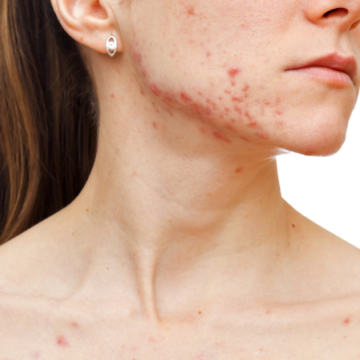
- Acne is caused by inflammation, and it can cause hyperpigmentation and textural changes.
- The best way to prevent scars is to treat acne right away.
- Sun damage can make you more prone to acne scars and blemishes.
How to prevent acne scars

Acne can leave long-lasting depression or textural change on the skin, while post-inflammatory hyperpigmentation can give you a purple, grey, or brown mark.
Acne is a result of inflammation, and depending on the degree of that inflammation and your skin type, they can leave blemishes or an indentation on your skin as it tries to heal, says dermatologist Ivy Lee, MD, assistant clinical professor of dermatology at UCLA.
Lee says the best way to prevent them is to treat acne before it starts because it is harder to deal with scars.
Below are certain habits you should avoid to make your skin clear up without leaving a mark.
1. Skipping sunscreen

Using products that treat acne makes the skin more sensitive to UV rays, and sun damage can make your skin prone to scars and discoloration, says Dr. Lee. Always wear sunscreen to protect your skin from scarring, as well as cancer, wrinkles.
2. Popping your pimples

Dr. Lee explains that rubbing, scratching, or picking your pimples can increase your risk of discoloration and scarring, and more inflammation. Instead, dab a bit of spot treatment on your acne, and wait until it heals.
3. Clearing your pores

Board-certified dermatologist Kally Papantoniou, MD, FAAD, warns against extracting your pimples or blackheads using metal tools or your fingernails to avoid scarring. Leave the extraction to trained professionals to prevent trauma and inflammation. If you can’t quit the habit, make sure to clean and sanitize your tools before and after each use to prevent spreading bacteria, and to use tissue paper between the metal and your skin to act as a barrier, recommends Dr. Papantoniou.
4. Taking a very hard look in the mirror
Staring at your pores in the mirror all the time will only make you obsess over the unnoticeable blemishes. Dr. Papantoniou discourages people from looking in magnifying mirrors and picking at every pore as this may cause more damage, such as breakouts and scars.
5. Using a washcloth to wash your face

The skin is a natural protective barrier against environmental elements, and washing your face with washcloths, mechanical facial cleansing brushes, and exfoliating mitts can thin out your skin. These cleaning materials may feel like they’re deep cleaning your pores, but they can be too harsh, says Dr. Lee. If you wear your skin too much, it can become irritated, sensitive, and prone to bacterial infection, which can result in acne scars.
6. Wearing heavy makeup

You may be tempted to cover up your blemishes with foundation or make-up, but they can cause skin irritation and worsen acne scars. Dr. Lee recommends using oil-free and non-comedogenic options to prevent making things worse.
7. Using the same treatment for years

Having a regular anti-acne skin-care routine is a great start, but you should see a dermatologist if you’re starting to get acne scars. A dermatologist can administer painless blue light therapy to kill bacteria on your skin that causes acne, says Dr. Papantoniou. She also recommends getting a regular monthly facial to help reduce acne breakouts, and professionally clean out pores to reduce the risk of scarring.

